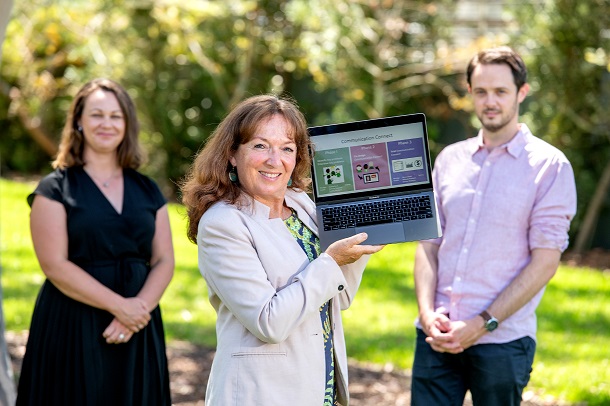 Bendigo Health Manager of Speech Pathology and Audiology Tracy Sheldrick (left) with Professor Miranda Rose and John Pierce from La Trobe University
Bendigo Health Manager of Speech Pathology and Audiology Tracy Sheldrick (left) with Professor Miranda Rose and John Pierce from La Trobe University
Bendigo Health has been named as one of three sites for a ground breaking new study designed to research how technology can be used to improve the lives of people with communication disability.
The project communication connect has been made possible thanks to an NHMRC ideas grant of $1.8 million.
Bendigo Health Manager of Speech Pathology and Audiology Tracy Sheldrick said the research project would be conducted over five years.
In the first phase researchers will meet with health professionals and people with communication disabilities resulting from aphasia or traumatic brain injury (TBI) to understand what they want and need from technology. Phase two will focus on co-designing technology and other solutions. The third and final phase will be working with 120 people with communication disability and their significant other to trial what’s been developed.
“It’s an exciting large scale study and Bendigo Health are the only regional and only Victorian site to take part,” Tracy said. “The team of researchers is phenomenal and it’s an amazing opportunity for Bendigo Health speech pathology and the community.
“People can experience communication disabilities of varying severity. Aphasia occurs most commonly after stroke when there is damage to the left hemisphere of the brain. Aphasia can affect understanding and use of language. Communication disability is also common after TBI. Cognitive-linguistic difficulties caused by changes in attention, processing, planning, memory and behaviour can impact on the way a person can communicate.”
Also being undertaken is The Aphasia PRISM Study funded by a Stroke Seed Grant, with Dr Caroline Baker and connected with Monash Health and the Aphasia Centre of Research Excellence.
“This study is looking at mood interventions for people with aphasia,” Tracy said. “Anxiety and depression is prevalent after a stroke, and increases when a person has aphasia. Communication disabilities can make people isolated, when you’re isolated you’re more at risk of mood disorders. This is a smaller study but we are excited to partner with researchers to learn more about aphasia and mood interventions.”